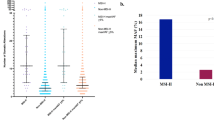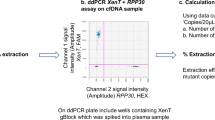Abstract
The use of conventional methods (immunohistochemistry, pentaplex PCR) for detecting microsatellite instability (MSI), a predictive biomarker of immunotherapy efficacy, is debated for cancers with low MSI prevalence, such as breast cancer (BC). We developed two multiplex drop-off droplet digital PCR (ddPCR) assays targeting four microsatellites, initially identified from public BC whole-genome sequencing dataset. Performances of the assays were investigated and 352 tumor DNA and 28 circulating cell-free DNA from BC patients, with unknown MSI status were blindly screened. Cross-validation of ddPCR MSI status with other MSI detection methods was performed. We then monitored circulating tumor DNA (ctDNA) dynamics before and during pembrolizumab immunotherapy in one patient with MSI-high (MSI-H) metastatic BC. The assays showed high analytical specificity and sensitivity (limit of detection = 0.16%). Among N = 380 samples, seven (1.8%) were found as MSI-H by ddPCR with six of them confirmed by next-generation sequencing (NGS). Specificity was 100% in N = 133 microsatellite stable BC submitted to NGS. In the patient with MSI-H metastatic BC, ctDNA monitoring revealed an early decrease of microsatellite mutant allelic frequencies during immunotherapy. These results demonstrated MSI detection by ddPCR, a non-invasive, fast and cost-effective approach, allowing for large pre-screening of BC patients who may benefit from immunotherapy.
This is a preview of subscription content, access via your institution
Access options
Subscribe to this journal
Receive 50 print issues and online access
$259.00 per year
only $5.18 per issue
Buy this article
- Purchase on Springer Link
- Instant access to full article PDF
Prices may be subject to local taxes which are calculated during checkout






Similar content being viewed by others
Data availability
The human sequence data generated in this study are not publicly available due to patient privacy. Other data generated in this study are available within the article and its supplementary data files.
References
Lorenzi M, Amonkar M, Zhang J, Mehta S, Liaw KL. Epidemiology of microsatellite instability high (MSI-H) and deficient mismatch repair (dMMR) in solid tumors: a structured literature review. J Oncol. 2020;2020:1–17.
Cicek MS, Lindor NM, Gallinger S, Bapat B, Hopper JL, Jenkins MA, et al. Quality assessment and correlation of microsatellite instability and immunohistochemical markers among population- And clinic-based colorectal tumors: Results from the colon cancer family registry. J Mol Diagnostics. 2011;13:271–81.
McConechy MK, Talhouk A, Li-Chang HH, Leung S, Huntsman DG, Gilks CB, et al. Detection of DNA mismatch repair (MMR) deficiencies by immunohistochemistry can effectively diagnose the microsatellite instability (MSI) phenotype in endometrial carcinomas. Gynecol Oncol. 2015;137:306–10.
Hause RJ, Pritchard CC, Shendure J, Salipante SJ. Classification and characterization of microsatellite instability across 18 cancer types. Nat Med. 2016;22:1342–50.
Brahmer J, Reckamp KL, Baas P, Crinò L, Eberhardt WEE, Poddubskaya E, et al. Nivolumab versus docetaxel in advanced squamous-cell non– small-cell lung cancer. N Engl J Med. 2015;373:123–35.
Balar A, Galsky M, Rosenberg J, Powles T, Petrylak D, Bellmunt J. Atezolizumab as first-line therapy in cisplatin-ineligible patients with locally advanced and metastatic urothelial carcinoma: a single-arm, multicentre, phase 2 trial. Lancet 2017;389:67–76.
Le DT, Durham JN, Smith KN, Wang H, Bartlett BR, Aulakh LK, et al. Mismatch repair deficiency predicts response of solid tumors to PD-1 blockade. Science 2017;357:409–13.
Suraweera N, Duval A, Reperant M, Vaury C, Furlan D, Leroy K, et al. Evaluation of tumor microsatellite instability using five quasimonomorphic mononucleotide repeats and pentaplex PCR. Gastroenterology 2002;123:1804–11.
Bonneville R, Krook MA, Kautto EA, Miya J, Wing MR, Chen H-Z, et al. Landscape of microsatellite instability across 39 cancer types. JCO Precis Oncol. 2017;1:1–15.
Middha S, Zhang L, Nafa K, Jayakumaran G, Wong D, Kim HR, et al. Reliable pan-cancer microsatellite instability assessment by using targeted next-generation sequencing data. JCO Precis Oncol. 2017;1:1–17.
Willis J, Lefterova MI, Artyomenko A, Kasi PM, Nakamura Y, Mody K, et al. Validation of microsatellite instability detection using a comprehensive plasma-based genotyping panel. Clin Cancer Res. 2019;25:7035–45.
Cortes-Ciriano I, Lee S, Park WY, Kim TM, Park PJ. A molecular portrait of microsatellite instability across multiple cancers. Nat commun Nat commun. 2017;8:1–12.
Mosele F, Remon J, Mateo J, Westphalen CB, Barlesi F, Lolkema MP, et al. Recommendations for the use of next-generation sequencing (NGS) for patients with metastatic cancers: a report from the ESMO Precision Medicine Working Group. Ann Oncol. 2020;31:1491–505.
Long DR, Waalkes A, Panicker VP, Hause RJ, Salipante SJ. Identifying optimal loci for the molecular diagnosis of microsatellite instability. Clin Chem. 2020;66:1310–8.
Schmitt FC, Soares R, Gobbi H, Milanezzi F, Santos-Silva F, Cirnes L, et al. Microsatellite instability in medullary breast carcinomas. Int J Cancer. 1999;82:644–7.
Lee S-C, Berg KD, Sherman ME, Griffin CA, Eshleman JR. Microsatellite instability is infrequent in medullary breast cancer. Am Soc Clin Pathol. 2001;115:823–7.
Horimoto Y, Thinzar Hlaing M, Saeki H, Kitano S, Nakai K, Sasaki R, et al. Microsatellite instability and mismatch repair protein expressions in lymphocyte-predominant breast cancer. Cancer Sci. 2020;111:2647–54.
Fusco N, Lopez G, Corti C, Pesenti C, Colapietro P, Ercoli G, et al. Mismatch repair protein loss as a prognostic and predictive biomarker in breast cancers regardless of microsatellite instability. JNCI Cancer Spectr. 2018;2:4–6.
Hechtman JF, Rana S, Middha S, Stadler ZK, Yaeger R, Zehir A, et al. Retained mismatch repair protein expression occurs in approximately 6% of microsatellite instability-high cancers and is associated with missense mutations in mismatch repair genes. 2020;33:871–9.
Gilson P, Merlin JL, Harlé A. Detection of microsatellite instability: state of the art and future applications in circulating tumour DNA (ctDNA). Cancers. 2021;13:1491–21.
Hempelmann JA, Scroggins SM, Pritchard CC, Salipante SJ. MSIplus for integrated colorectal cancer molecular testing by next-generation sequencing. J Mol Diagnostics. 2015;17:705–14.
Zhu L, Huang Y, Fang X, Liu C, Deng W, Zhong C, et al. A novel and reliable method to detect microsatellite instability in colorectal cancer by next-generation sequencing. J Mol Diagnostics Am Soc Investigative Pathol Assoc Mol Pathol. 2018;20:225–31.
Gallon R, Sheth H, Hayes C, Redford L, Alhilal G, O’Brien O, et al. Sequencing-based microsatellite instability testing using as few as six markers for high-throughput clinical diagnostics. Hum Mutat. 2020;41:332–41.
Guardant Health. Guardant360® CDx First FDA-Approved Liquid Biopsy for Comprehensive Tumor Mutation Profiling Across All Solid Cancers. 2020. Available from: https://investors.guardanthealth.com/press-releases/press-releases/2020/Guardant-Health-Guardant360-CDx-First-FDA-Approved-Liquid-Biopsy-for-Comprehensive-Tumor-Mutation-Profiling-Across-All-Solid-Cancers/default.aspx.
Woodhouse R, Li M, Hughes J, Delfosse D, Skoletsky J, Ma P, et al. Clinical and analytical validation of foundation one liquid CDx, a novel 324-Gene cfDNA-based comprehensive genomic profiling assay for cancers of solid tumor origin. PLoS One. 2020;15:1–18.
Georgiadis A, Durham JN, Keefer LA, Bartlett BR, Zielonka M, Murphy D, et al. Non-invasive detection of microsatellite instability and high tumor mutation burden in cancer patients treated with PD-1 blockade. Clin Cancer Res. 2019;25:7024–34.
Yu F, Leong KW, Makrigiorgos A, Adalsteinsson VA, Ladas I, Ng K, et al. NGS-based identification and tracing of microsatellite instability from minute amounts DNA using inter-Alu-PCR. Nucleic Acids Res. 2020;49:1–8.
Davies H, Morganella S, Purdie CA, Jang SJ, Borgen E, Russnes H, et al. Whole-genome sequencing reveals breast cancers with mismatch repair deficiency. Cancer Res. 2017;77:4755–62.
Silveira AB, Bidard FC, Kasperek A, Melaabi S, Tanguy ML, Rodrigues M, et al. High-accuracy determination of microsatellite instability compatible with liquid biopsies. Clin Chem. 2020;66:606–13.
Huggett JF, Foy CA, Benes V, Emslie K, Garson JA, Haynes R, et al. The digital MIQE guidelines: minimum information for publication of quantitative digital PCR experiments. Clin Chem. 2013;59:892–902.
The dMIQE Group, Huggett JF. The digital MIQE guidelines update: minimum information for publication of quantitative digital PCR experiments for 2020. Clin Chem. 2020;66:1012–29.
Acknowledgements
We thank Laetitia Fuhrmann and the Biological Resource Center (CRB) for providing clinical samples, Frederic Maraone from the Pharmacogenomic service for technical support, Maya Nourieh and Hrant Ghazelian for providing IHC images, Benjamin Renouf and Corinne Ajrizov for retrieving clinical data and Alexandre Houy for providing WES analysis results.
Author information
Authors and Affiliations
Contributions
KZK, FCB, SR, and MHS designed the study. KZK, CH, AR, and ABS performed experiments. KZK, FCB, SR, and MHS analyzed data. OTG, IB, FCB, NK, LC, CP, JYP, and AVS contributed with identification of clinical samples. TP performed in silico microsatellite identification. MM performed combinatorial analysis. OTG, JMP and VR performed NGS analysis. GB and SN performed IHC analysis and provided with IHC images. KZK, SR, and FCB wrote the manuscript.
Corresponding authors
Ethics declarations
Competing interests
This work was supported by the Ligue Nationale Contre le Cancer (LNCC, N/Ref: RS21/75-47), Servier (Ref: CT0079257), and the Innovative Medicines Initiative Joint Undertaking under grant agreement n° 115749 (Cancer-ID). AB Silveira, FC Bidard, C Proudhon, and MH Stern are co-inventors of patent PCT/EP 2018/068760, WO2019011971. A patent application on this work where FC Bidard, KZ Klouch, S Renault, AB Silveira, MH Stern, C Proudhon are co-inventors has been filed (24/03/2022, EP22305360). No potential conflicts of interest were disclosed by the other authors.
Additional information
Publisher’s note Springer Nature remains neutral with regard to jurisdictional claims in published maps and institutional affiliations.
Supplementary information
Rights and permissions
Springer Nature or its licensor (e.g. a society or other partner) holds exclusive rights to this article under a publishing agreement with the author(s) or other rightsholder(s); author self-archiving of the accepted manuscript version of this article is solely governed by the terms of such publishing agreement and applicable law.
About this article
Cite this article
Klouch, K.Z., Stern, MH., Trabelsi-Grati, O. et al. Microsatellite instability detection in breast cancer using drop-off droplet digital PCR. Oncogene 41, 5289–5297 (2022). https://doi.org/10.1038/s41388-022-02504-6
Received:
Revised:
Accepted:
Published:
Issue Date:
DOI: https://doi.org/10.1038/s41388-022-02504-6



